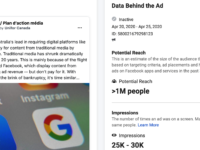Earlier this week, I posted on the lobbying campaign of News Media Canada, the group representing the major Canadian news media publishers, to call for the creation of a government digital media regulatory agency that would have the power to establish mandated payments for linking to news articles on social media sites, establish what content is prioritized on those sites, and potentially issue fines in the hundreds of millions of dollars. The report inaccurately describes the proposed Australian approach upon which it is modelled, avoids acknowledging that payments would be for links, and would open the door to hundreds of millions on tariff retaliation.
Post Tagged with: "link licensing"
Where is Canada’s News Media Lobby Promoting Its Link Licensing Plan for Facebook? On Facebook
Last week, News Media Canada, the lobby group representing the major Canadian news media publishers, released a report calling for the creation of a government digital media regulatory agency that would have the power to establish mandated payments for linking to news articles on social media site, establish what content is prioritized on those sites, and potentially issue fines in the hundreds of millions of dollars. As I noted in my review of the report, it inaccurately describes the proposed Australian approach upon which it is modeled, avoids acknowledging that payments would be for links, and would open the door to hundreds of millions on tariff retaliation by the US under the USMCA.
The report was widely covered by the publishers promoting it: the National Post devoted its front page to the report, the other Postmedia papers all found time to cover the release, and the Toronto Star ran multiple articles and opinion pieces on it. In addition to the front page of some newspapers, the papers themselves posted the stories on Facebook, often multiple times. For example, the National Post front page story was posted 11 times by Postmedia papers including posts from the National Post (twice), Calgary Herald, Ottawa Citizen, Montreal Gazette, Edmonton Journal, Windsor Star, London Free Press, Vancouver Sun, Regina Leader-Post, and Saskatchewan StarPhoenix. The National Post also ran a story in the Financial Post on the report which posted on Facebook, a Diane Francis opinion piece on the report which it posted on Facebook, and a story on what happens when a local newspaper dies, which it posted twice on Facebook. In fact, just this morning, there is yet another op-ed in support of the report by Jerry Dias, which appears in both the National Post and Ottawa Citizen, with both immediately posting to Facebook.
Forget Link Licensing and Cross-Subsidies: When it Comes to Tech, Canada Should be Focused on Competition Law and Tax Policy
Canadian Heritage Minister Steven Guilbeault was recently asked about his plans to mandate licensing of links to news articles on social-media sites such as Facebook. While the policy is often referred to as a link tax, Mr. Guilbeault insisted that it was not a tax, stating “some people think every time the government acts, it’s a tax. What I’m working on has nothing to do with tax.” Instead of a government tax scheme, Mr. Guilbeault explained that he intends to have the Copyright Board of Canada set a fee for the links to articles, backed by government power to levy fines for non-payment.
Leaving aside the semantic debate over what constitutes a government tax, my Globe and Mail op-ed argues that the comments are notable because when it comes to addressing the concerns associated with the large technology companies, Canada should be working on taxation. Mr. Guilbeault has said his top legislative priority is to “get money from web giants,” yet rather than focusing on conventional tax policy, his preference is to entrench cross-subsidy programs that keep the money out of general tax revenues and instead allow for direct support to pet projects and favoured sectors.
As Heritage Minister Steven Guilbeault Plans Link Taxes and Internet Content Regulation, Where Is Navdeep Bains?
Canadian Heritage Minister Steven Guilbeault continued his media tour in support of link taxes and Internet content regulation yesterday with interviews in the Toronto Star and Radio-Canada. The Toronto Star compares technology companies to polluters, doubles down on calling social media linking to news articles without a licence “immoral”, questions why Facebook has said it will stop news sharing in Australia with mandated licensing (“I’m like, really guys”), and raises the possibility of using copyright to require payments for linking. In the Radio-Canada interview, he admits that Netflix already invests in Canada (CRTC chair Ian Scott says it is the biggest single contributor to film and television production in Canada) but that he wants regulation to raise hundreds of millions of dollars to support francophone, native, and minority community productions.
I’ve written extensively on why the claim that linking without a licence is immoral is wrong, why Facebook is right to push back against link licensing, and how Canadian film and television production is enjoying record success because of international streaming services, not in spite of them. But there is one line in the Radio-Canada that particularly caught my attention. When asked about the timing of a bill to mandate online Cancon, Guilbeault acknowledges that “obviously I am not the only minister [responsible] for the bill.”










